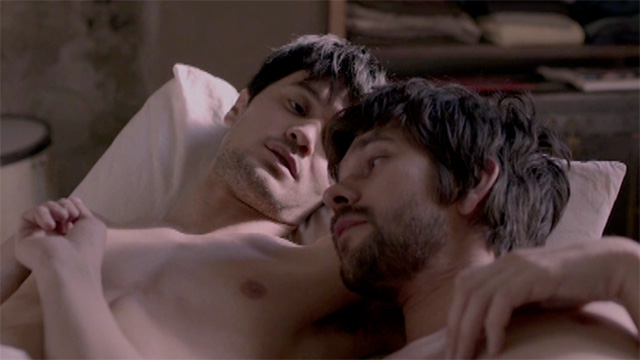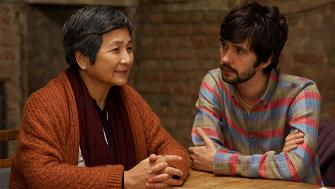
Lilting is about loss times two. Mother and partner divided when their love object was alive. Battling still after his unexpected death. But although you will get teary eyed, the film is not depressive by any measure.
Why?
Writer/director Hong Khaou's debut feature is exhilarating in its craft, its performances, and its tale of the eventual fusing of two disparate hearts. Also, in its timeliness. Many ethic groups residing in Western countries are still more than a few steps behind in their acceptance of same-sex relationships.
The film commences with the handsome, lithe Kai (Andrew Leung) visiting his mother Junn (Cheng Pei Pei) in a London retirement home. Junn, of Cambodian-Chinese origin, although having lived in England for decades, has never bothered to become proficient in English. In fact, "Fuck you very much"is about her total vocabulary. A widow, Junn has consequently always depended on Kai for everything, to his chagrin. But instead of thanks, she asks accusingly in Mandarin, "Do you know how it feels to be locked up by your son?"The young man tries to comfort her by noting the situation is only temporary. But how temporary?
Besides Junn's dwindling memory, these circumstances have mainly come about because Kai is closeted to his mother, though open to the rest of the world. He's afraid she couldn't handle the truth. His lover Richard (Ben Whishaw) disagrees. "Come out so she can live with us,"he offers.
The lovers converse about the matter in bed, after kissing and making love, but Kai isn't convinced ("For some reason, she thinks you're a dick"). And if Kai had been convinced, it would be too late.
You see he is already deceased as the film begins, but the two survivors can't let him go. We've been watching their memories, which they relive frequently. And Richard's love is so formidable, it spills over onto his feelings for Junn. He needs her to keep Kai alive. Visiting Junn to reach out, he fails in his quest. She's hostile to him, and anyway how can they communicate?
So Richard hires a translator, Vann (Naomi Christie), who speaks Mandarin, to break down Junn's loneliness and isolation, even though she isn't that isolated. She has an elderly wooer, Alan (Peter Bowles), who brings her flowers and chats with her daily, even though neither knows of what the other says, which is lucky for Alan when he avows: "If I were younger, I'd take off all of your clothes and have you on the table."Vann suddenly unveils the meaning of the couple's chatter with unanticipated results.
 But Lilting is basically about Richard and his "mother-in-law"of sorts, who believes the young man before her was just a friend of her son who broke up her family. As portrayed by Whishaw, one of Britain's finest younger actors (Perfume: The Story of a Murderer; Cloud Atlas), Richard is a walking embodiment of Goethe's Young Werther. The ache of genuine endearment and the resulting heartache have seldom seemed so genuine on the screen. As for Cheng, she's a noted Chinese film actress with over 70 film credits, many involving swordplay (including Crouching Tiger). Her bladeless performance here gains her easy entry into the Judi Dench pantheon.
But Lilting is basically about Richard and his "mother-in-law"of sorts, who believes the young man before her was just a friend of her son who broke up her family. As portrayed by Whishaw, one of Britain's finest younger actors (Perfume: The Story of a Murderer; Cloud Atlas), Richard is a walking embodiment of Goethe's Young Werther. The ache of genuine endearment and the resulting heartache have seldom seemed so genuine on the screen. As for Cheng, she's a noted Chinese film actress with over 70 film credits, many involving swordplay (including Crouching Tiger). Her bladeless performance here gains her easy entry into the Judi Dench pantheon.
So let Lilting, a melding of two related strangers' melodies, supply you with a catharsis or two, too. I, who have wept infrequently since Anais Nin's demise in 1977, was wet-eyed at least four times during the screening, and it felt splendid.
Lilting, along with The Way He Looks and Boys, was one of the highlights of the recent NewFest film festival held in conjunction with the Film Society of Lincoln Center. It will have a regular run beginning in September in major cities.
